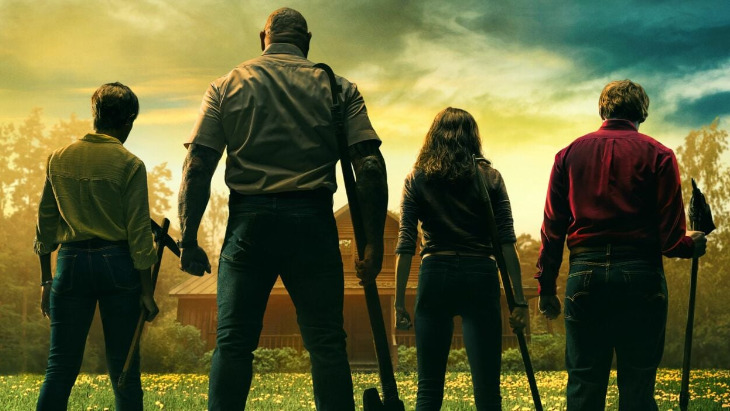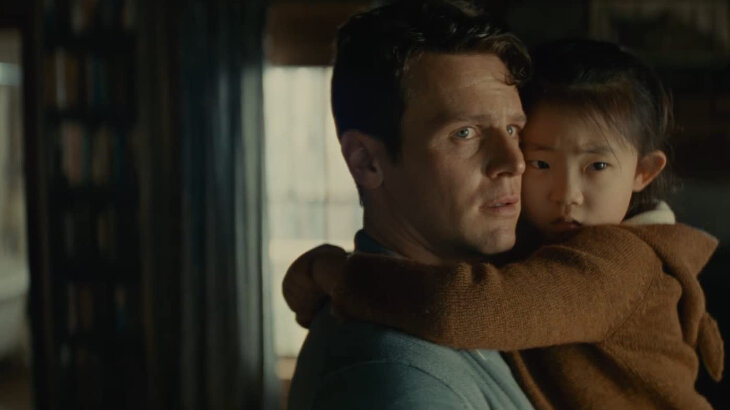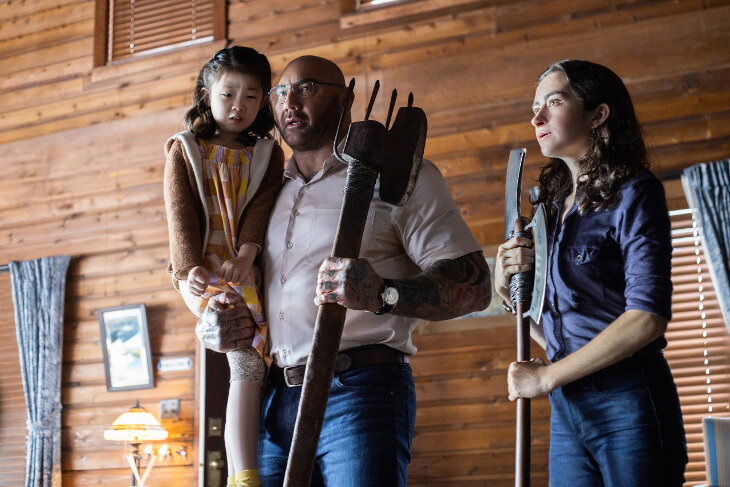 Vampire Weekend's Surprising Jewish Stories
Vampire Weekend's Surprising Jewish Stories


8 min read
What is Judaism’s response to one of the oldest philosophical problems?
Four strangers show up at a cabin in the middle of the Pennsylvania woods where a small family is vacationing. They force their way in, tying up two men and their daughter, and pose a problem to them: the apocalypse is coming and it can only be stopped by a choice. The family must willingly sacrifice one of their own, or everyone else on earth will die. Will they choose, and if yes, who will they sacrifice?
This is the set-up of M. Night Shyamalan’s horror flick Knock at the Cabin. Is there a morally correct way to deal with its unnerving premise?
Judaism has an answer. Well, actually, a few answers. Some spoilers ahead.
The short answer: no.
The long answer: no, in almost all cases, traditional Jewish law does not allow us to trade one life for another. Based on the Talmud, the Shulchan Arukh, a code of Jewish law compiled in the 16th century, lists murder as one of the prohibitions one must be willing to die rather than transgress (Yoreh De’ah, 157). If someone demands that you kill somebody or else they’ll kill you, you must allow yourself to be killed. The classic Talmudic phrase is, “Who says your blood is redder?” which is to say, “Who says your life is any more important?”

The Rema, a prominent contemporary whose glosses to the Shulchan Arukh are included in almost every modern printing, poses a scenario not too dissimilar from Knock at the Cabin’s. If a group of Jews is approached and told “Give us one of your own so we can kill him, or else we will kill all of you,” they are not allowed to choose someone to be killed. If they are asked to give over a specific person by name, they may, but some authorities limit this only to the case of a person who has already been sentenced to the death penalty. Even with this exception, you may not choose someone to be killed.
It doesn’t matter if the person would be killed as part of the group they’re in anyway, Jewish law prohibits handing someone over to be killed and certainly does not condone making the active choice of killing a fellow Jew on behalf of the murderers.
In almost all cases, you cannot actively bring about someone’s death.
Philosophers often pose this question as the trolley problem: if a trolley is going to run over five people and you have a lever you can pull so that the trolley only kills one instead, should you pull it? On the one hand, you could be minimizing the number of lives lost, but on the other hand, you would be actively participating in killing someone. Judaism makes the answer easier: you cannot actively bring about someone’s death in almost all cases.
The short answer: yes.
The long answer: yes, traditional Jewish law says that you may protect your own life at the expense of the life of the person threatening you. The Torah teaches that if you kill someone who is coming to rob you by tunneling into your home, you are guilty of nothing (Exodus 22:1). The fact that the potential thief is tunneling (in modern terms, breaking and entering with intent to kill) shows that they don’t care about the possibility of people being home. This is classically interpreted to mean more than just a lack of guilt for a person defending themselves — if you know someone is coming to kill you, you have the imperative to rush to kill him first.
In Knock at the Cabin, the characters are being threatened with weapons and told they will have to make a choice. While the four invaders state that they do not intend to kill any of the three family members themselves, they still force their way into the cabin, breaking windows and doors along the way. Per Jewish law, it would be permissible to kill any one of the intruders in self-defense (laws of secular government notwithstanding).
The short answer: depends.
The long answer: Judaism has a long line of prophets — 48 men and 7 women whose prophecies have been passed down through tradition, and there have been millions of others throughout Jewish history. If someone were to arise today and claim they were a prophet, we would likely be skeptical for good reason. If someone claims to be a prophet, the Torah has a set of criteria to verify the prophet. Maimonides teaches that we should test him many times by asking him to predict future events — if all his predictions come true, he may be considered a true prophet (Foundations of Torah, 10:1-2) and we are directed to listen to him.

Now, here’s where things get interesting. We said that you cannot actively bring about someone’s death in almost all cases. Well, if that person who’s been confirmed as a true prophet tells you that a certain part of the Torah is no longer binding, they’re immediately considered a false prophet and should be put to death, no matter how many accurate predictions they’ve made. But if the person tells you that a part of the Torah should be temporarily overridden — anything short of idolatry — then you must listen to them.
A person cannot reach this status of a believed prophet immediately. It takes time and proven, accurate predictions — even one false prediction marks them as a false prophet. But yes, given the right set of circumstances, it’s not impossible that they could reach a point where they tell you to kill one person and you have to listen to them.
The short answer: consult their rabbi!
The long answer: a situation like this has a significant number of factors that need to be examined, so let’s examine them. The four people, Leonard, Redmond, Sabrina, and Adriane came in by force — at this point, any of the members of the family — Eric, Andrew, or their daughter Wen — could have killed one of the intruders in self-defense (in Judaism, we generally have a concept that one must follow the laws of the secular government, but with Pennsylvania’s permissive stand-your-ground laws, that’s a non-issue). If Eric, Andrew, or Wen acted in self-defense and killed the four strangers, the problem would no longer exist.
If, as in the movie, they did not kill the intruders, and they wanted to fairly engage with the challenge — instead of trying to escape, ignore, or otherwise deal with the situation — they would need to ask Leonard and/or his compatriots to accurately predict the future, many times. In the movie, the predictions are vague. Leonard says that hundreds of thousands will die every time the family doesn’t make a choice, but he never says how. He gives vague predictions that make sense later, but per Jewish requirements, it doesn’t seem like enough. Based on how everything goes down in the movie, the answer to the problem is simple: don’t kill anyone, unless it’s an intruder who’s potentially threatening your life.
What if Leonard and his three fellows — whose clear symbolism of the four horsemen of the apocalypse is very un-Jewish — had studied Maimonides and the Shulchan Arukh and wanted to make sure that they’d be taken seriously? It’s highly unlikely based on the throughline of Jewish tradition that a prophet would come with the demand for someone to kill an innocent family member as a mechanism for saving the world. But let’s pretend that they were on the level and wanted to carry out their mission properly.
They could have come to the cabin and told Eric, Andrew, and Wen that they were prophets. Then they could have clarified that they were not prophets of some false god or idolatrous entity. They could have made several specific predictions — say, there will be a tsunami at this specific hour on that specific island, instead of the vague idea that something bad will happen — that would all come true and prove their validity as prophets. They could have said that they acknowledged murder is bad, but in this one specific case, because of their prophetic vision, it is necessary for the family to choose someone and kill them, to save the world.
Then — and only then, under those very specific circumstances — the right thing to do would be to say, “Well, we have to do what you say,” choose someone, kill them, and save the world. And before that, consult a rabbi to make sure every possible avenue has been examined.
